I managed to borrow George Yeo’s book Musings: Series One from the library in Singapore and it taught me three things:
- Chinese versus Western views of government
- Singapore is (not) a Chinese country
- Overseas Chinese have a “Jewish” status
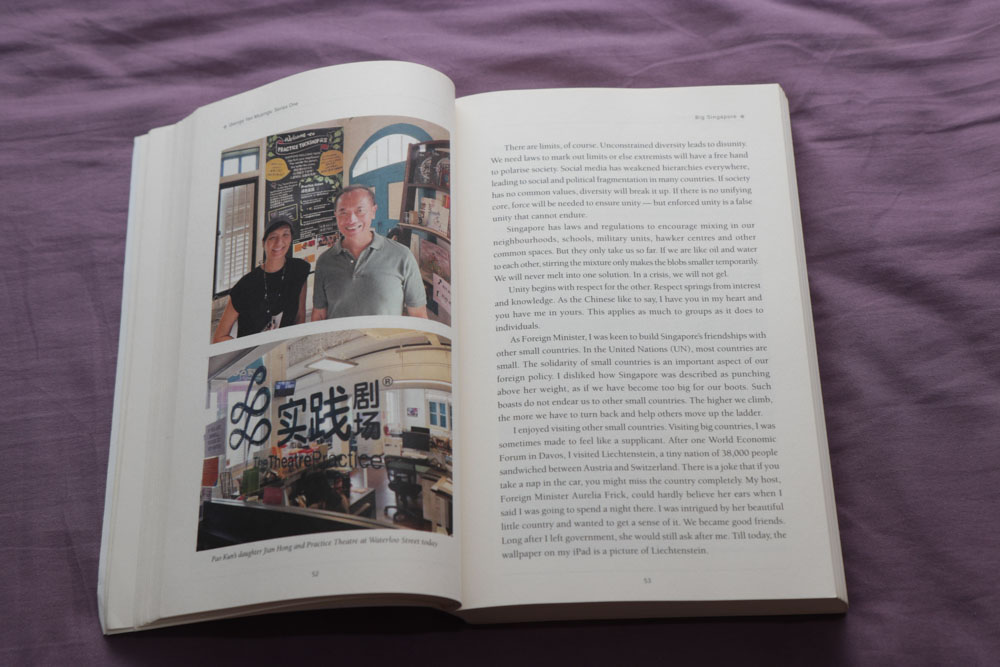
Who is George Yeo? And why am I reading his book?

For non-Singaporeans, George Yeo’s name might not ring a bell.
Succinctly, he’s a “Teochew Chinese, a Roman Catholic and a native Singaporean.”
Wikipedia can offer the “vital stats”,
George Yeo Yong-Boon (Chinese: 杨荣文; pinyin: Yáng Róngwén; born 13 September 1954) is a Singaporean former politician and brigadier-general who served as Minister for Foreign Affairs between 2004 and 2011.
As for his identity as a Chinese person, here’s what he has to say,
My identity came from my family. My paternal grandfather came to the Nanyang region from Wenli Village in the town of Anbu. He owned rubber plantations along the Johor River, only accessible by boat, and became a man of means. With the money he made, he came to own substantial farmland back in Anbu Town and built a big house in the village. He attained a certain social status when he returned to China and was called Ah Ye. My father was born in Johor in 1916 on a rubber plantation but had his birth registered in Singapore.
On the other hand, two chapters in, I felt his regrets as if they were my own. He writes,
“If I could roll back the clock, I would have preferred to have studied Chinese too. Learning Chinese as an adult, as what I did, is much more difficult.”
“I only started learning Chinese seriously as an undergraduate in Cambridge. I bought books from the Guanghwa book shop in London’s Chinatown which came with audio cassettes.”
“It is one of my regrets in life not to be proficient in Chinese.”
Musings. 27-28
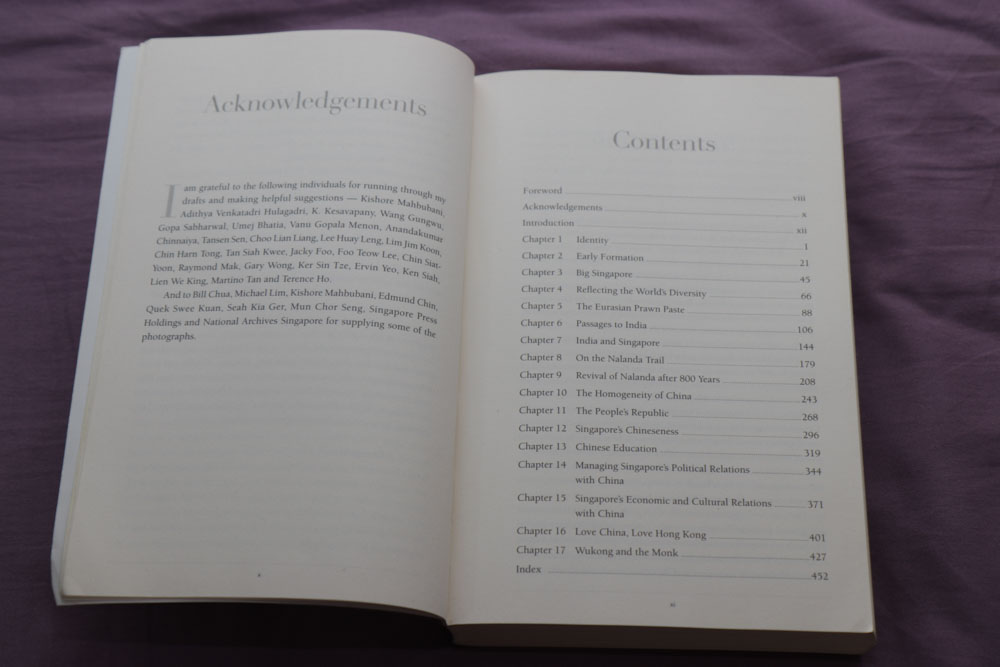
Chinese vs Western views of government
Through reading George Yeo’s book, I realized that perhaps the Chinese view of good, functioning government differs from the Western view of it.
He says,
It is a simplification but, generally speaking, it is rule by law and not rule of law in China.
Recall civis romanus sum: I am a Roman citizen. Throughout the Roman Empire, Roman citizens were protected by certain rights. St Paul claimed this right when he was arrested and was brought to Rome to be tried. His execution was by beheading. As a Roman citizen, he could not be crucified, unlike Jesus Christ and St Peter.Musings, 260
In the Western tradition, the ruler is subject to law. If he is an absolute monarch, like the Pope, he can make the law but has to act within it. If the exercise of the law leads to a perverse outcome, that outcome stands until the law has been changed. Depending on the jurisdiction, laws can only be changed following a process which itself is defined in law. The conception of law in China is fundamentally different from that in
the West.
On the other hand, a functioning government from a Chinese point of view involves the intersection principles from Confucianism and Taoism.
Confucianism ascribes a set of proper behaviours (礼, li) from different groups of people. Everyone is a big family and every individual has a place in this big family.
“Li” in Confucianism refers to a concept of proper behaviour and manners, signifying the rules and norms of social conduct. It encompasses respect, etiquette, and moral principles, and emphasizes the importance of following tradition and customs in personal and social relationships.
It ascribes the propriety to relationships between ruler and subject, parent and child, and husband and wife, with morality being seen as the foundation of these relationships.
Confucius (who came from Shandong) and his followers elaborated a system of proper behaviour, laying down clear expectations of how kings and ministers, rulers and people, husbands and wives, fathers and sons, brothers and friends should relate to each other. The entire nation is treated as a big family, with society composed of individual families; parents are required to teach their children the right way to behave.
I remember an occasion when one of my brothers criticised our father to our mother. Although father was not there to hear it, mother reproached my brother and told him never to do so again. Whatever wrong father had done to her was between husband and wife. We as children had to respect him as our father and had no right to criticise him, even behind his back.
Musings, 261
Government leaders are a further extension of this framework. Certainly a departure from the Western view of government.
Government leaders are supposed to behave like the heads of the nation-family. Leadership has to be moral even if it is hypocritical.
With the ubiquity of cameras, microphones and social media, that hypocrisy is easily exposed nowadays, which can create a crisis in leadership.
Official speeches are boring because they are supposed to be moral disquisitions. Important guests must often be addressed first, which is
Musings, 263
a tedious affair. Addressing them in the wrong sequence is embarrassing
at the very least. A ruler’s right to rule is governed by a moral mandate.
If they are immoral, they lose the Mandate of Heaven.
Morality is a bit hard to define and I don’t claim to know it best. But here’s what Wikipedia says. I read it and I’d say the best summary would be, “be good” in a specific way.
Another mystery that I’d like to explore further is the idea that Taoism plays a central role in every aspect of Chinese culture, even within government.
George Yeo says,
The philosophical counterbalance to Confucianism is Taoism. Taoist Philosophy, which is older than Confucianist philosophy, contains cycles within cycles. Cycles beyond our control have to be accepted for what
they are; we have to move with them. Cycles within our control often involve a moral choice.The most well-known text is Daodejing. 道 (dao) is ‘the way’. Only by knowing it can one achieve virtue 德 (de).
…
An even older text is the Book of Change, Yijing ,which some scholars consider to be the most important text in the Chinese classics.…
It is, however, a profound book about the nature of existence, binary division and cycles in the physical, biological and human worlds. The philosophy of the Yijing and the Daodejing suffuse Chinese governance and warcraft of all forms of Chinese art and martial art, Chinese spirituality and Chinese medicine.
Within this philosophical framework, law finds its proper place. The equivalent idea in the western mind is that human law must ultimately conform to natural law.
Musings, 264
So, Daodejing is the basis of the Chinese concept of natural law? When I find out, I’ll write about it.
Singapore is (not) a Chinese country
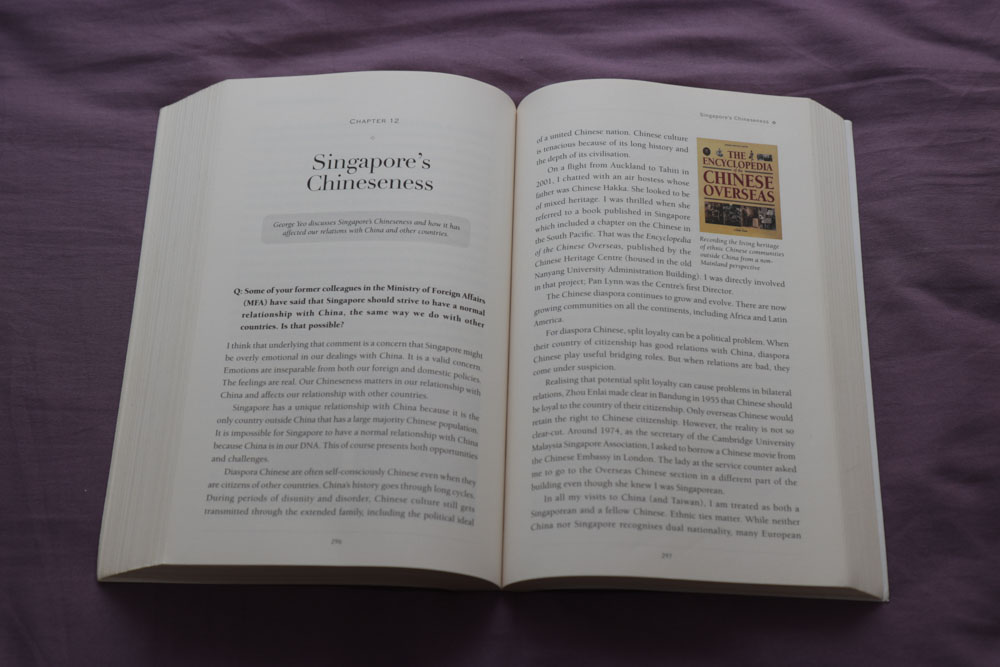
“Ethnic ties matter,” George Yeo says.
George Yeo said that when he visited China, he was treated both as a Chinese person and a Singaporean.
In fact, he recounted an event in 1974 when he needed to borrow a Chinese movie from the Chinese embassy in London. The receptionist told him to go to the Overseas Chinese section despite him not having China’s citizenship.
As a side note, the term “Overseas Chinese” can be interpreted differently. It could mean a person born outside of China for multiple generations (like me). In the previous case, it probably meant “Citizens of China who were overseas.”
Indeed, I felt the same sense of familiarity when I spoke to Chinese people from other places. Going to Spain and meeting the Chinese owners of the dollar-store equivalents made me felt strongly that we are one community.
It’s all very grey and fluid. Citizenship, ethnicity and personal experiences seem to not be set in rigid. I explored this by reviewing Wang Gungwu’s discussion about the term “Chinese diaspora” and its implications.
As a Chinese-Singaporean, I like to think of myself as Chinese but I am not from China. But I am of a different generation. One generation before me and beyond, some Singaporeans would see themselves as both citizens of their nations and also China, a bit like having dual citizenship without the paperwork.
He points to three examples:
First, Malaysian business tycoon Robert Kuok who “proudly proclaims that he is a patriotic overseas Chinese (爱国华侨)”,
Secondly, his father who “spoke no Mandarin and could not read Chinese” felt that “we lost” when the US beat China for the men’s gymnastics gold medal.
Thirdly, “Some of my Chinese Singaporean friends who are critical of China nonetheless get upset when they see Western countries finding fault with China.”
It’s as such that many Southeast Asian nations saw Singapore with suspicion and George Yeo doubts this suspicion that Singapore is an agent of China will ever go away.
Emotions are inseparable from both our foreign and domestic policies. The feelings are real. Our Chineseness matters in our relationship with China and affects our relationship with other countries.
Singapore has a unique relationship with China because it is the only country outside China that has a large majority Chinese population. It is impossible for Singapore to have a normal relationship with China because China is in our DNA. This of course presents both opportunities and challenges.
Musings, 296
When I interviewed Jamaican-Chinese Dalton Yap, I asked him why the Chinese association he volunteers in gets interest from people who are half- or quarter-Chinese. George Yeo provides a clue,
As China moves to centre stage in global politics and economics, the relationship between China and diaspora Chinese will naturally grow stronger. Chinese communities which lost their connection to China (like the Peranakans of Indonesia, Malaysia and Singapore) are finding renewed interest in Chinese heritage and language
Overseas Chinese people have a “Jewish” status?
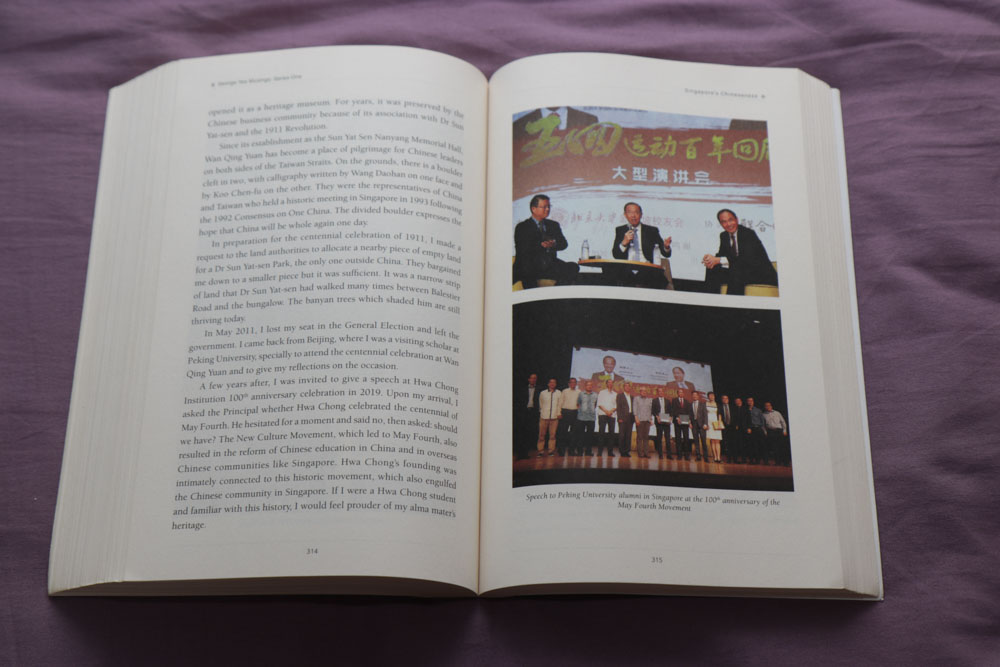
This is the boldest claim in my opinion.
I had to piece together specific paragraphs to put together a comprehensive understanding for myself as to what George Yeo meant.
The main cause of anti-Chinese sentiment in Southeast Asia is the disproportionate role ethnic Chinese play in business. Among the very many wealthy, many are ethnic Chinese. Some are known for their philanthropic work … but a few behave badly and live ostentatiously. Thailand’s King Rama VI criticised the ethnic Chinese as the ‘Jews of the East’”
Musings, 301
Chinese communities everywhere in Southeast Asia are conscious
of their “Jewish” status.Anti-Chinese sentiments have generally subsided but they are still there in the soil. In countries where bad experiences are more recent, a certain sense of insecurity is pervasive, like background music.
Singapore is a safe harbour they know they can turn to in a crisis. In Singapore, they can celebrate their Chineseness without worrying that some may take offence.
…
In 1998, Indonesia was shaken to its core by the Asian Financial Crisis.
Shadowy figures orchestrated racist attacks on Chinese Indonesians. Many fled to Singapore and stayed here for months.
I used to go running along East Coast Park and I remember seeing many of them taking evening strolls – women with their children and maids in tow looking out to the sea.
Musings, 306-307
Apparently, two years later, the Singaporean government invited an Indonesian scholar to give a speech about the Indonesian economy where “he expressed his gratitude to Singapore for our assistance to Indonesian Chinese in their darkest hour of need, choking on his tears.”
It’s not entirely clear where the “Jewish” and “overseas Chinese” intersect, but I will hazard a guess.
Perhaps it’s because of the concentration of wealth? Not sure if this is a stereotype, but if you believe The New York Times, which said,
New York Times, ‘Singapore and Malaysia Watch With Alarm : Indonesia’s Neighbors Fear Wave of Refugees’, Feb. 11, 1998
“About 7 million Chinese live in Indonesia, a nation of 200 million. Many are shopkeepers, traders and businessmen. Some have become very wealthy, to the point where the Chinese as a group are reputed to control about 70 percent of corporate wealth, although they make up only 3 percent of the population.
Or is it because overseas Chinese are easy scapegoats for a nation’s troubles?
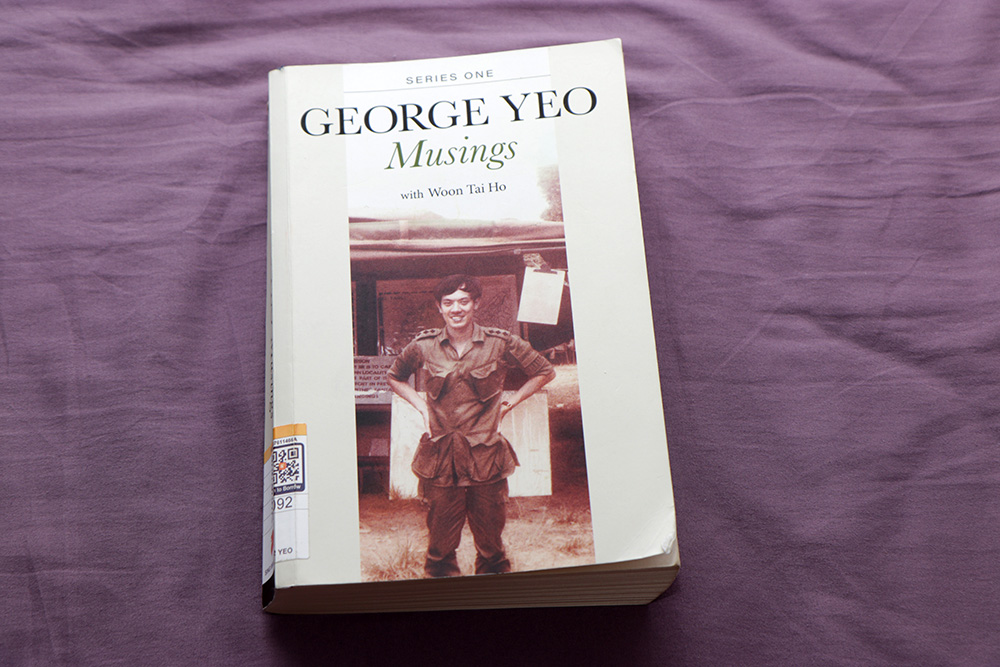
Leave a Reply